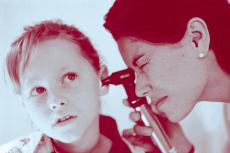[BIBLIOTECA DE GENÉTICA APLICADA - DESÓRDENES GENÉTICOS que producen PROBLEMAS AUDITIVOS EN LOS NIÑOS - NUEVO TÓPICO DE SALUD 2016]

Hearing Problems in Children Update
MedlinePlus sent this bulletin at 04/14/2016 01:10 PM EDTNew on the MedlinePlus Hearing Problems in Children page:

04/13/2016 02:39 PM EDT

Source: National Library of Medicine - 

04/13/2016 02:39 PM EDT

Source: National Library of Medicine - 

04/13/2016 02:39 PM EDT

Source: National Library of Medicine - 

04/13/2016 02:39 PM EDT

Source: National Library of Medicine - 

04/13/2016 02:39 PM EDT

Source: National Library of Medicine - 

04/01/2016 03:08 PM EDT

Source: National Library of Medicine - 

MEDICAL ENCYCLOPEDIA
National Institutes of Health
Languages
Most children hear and listen from the moment they are born. They learn to talk by imitating the sounds around them and the voices of their parents and caregivers. But about 2 or 3 out of every 1,000 children in the United States are born deaf or hard-of-hearing. More lose their hearing later during childhood.
Babies should have a hearing screening before they are a month old. If your child has a hearing loss, it is important to consider the use of hearing devices and other communication options by age 6 months. That's because children start learning speech and language long before they talk.
Hearing problems can be temporary or permanent. Sometimes, ear infections, injuries or diseases affect hearing. If your child does not hear well, get help.
NIH: National Institute on Deafness and Other Communication Disorders
- Hearing Loss in Children: Screening and Diagnosis (Centers for Disease Control and Prevention)Available in Spanish
- It Is Important to Have Your Baby's Hearing Screened
 (National Institute on Deafness and Other Communication Disorders)Available in Spanish
(National Institute on Deafness and Other Communication Disorders)Available in Spanish
- Hearing Evaluation in Children (For Parents) (Nemours Foundation)Available in Spanish
- Hearing Loss in Children: Treatment and Intervention Services (Centers for Disease Control and Prevention)Available in Spanish
- What to Do if Your Baby's Screening Reveals a Possible Hearing Problem
 (National Institute on Deafness and Other Communication Disorders)Available in Spanish
(National Institute on Deafness and Other Communication Disorders)Available in Spanish
- Hearing Assistive Technology (American Speech-Language-Hearing Association)
- MedlinePlus: Assistive Devices
 (National Library of Medicine)Available in Spanish
(National Library of Medicine)Available in Spanish
- American Sign Language
 (National Institute on Deafness and Other Communication Disorders)
(National Institute on Deafness and Other Communication Disorders) - Building Languages (Centers for Disease Control and Prevention)
- Earbuds (Nemours Foundation)Available in Spanish
- How Does Your Child Hear and Talk? (American Speech-Language-Hearing Association)
- Ototoxicity (Ear Poisoning) (For Parents) (Nemours Foundation)Available in Spanish
- Auditory Neuropathy
 (National Institute on Deafness and Other Communication Disorders)
(National Institute on Deafness and Other Communication Disorders) - Auditory Neuropathy Spectrum Disorder (ANSD) (For Parents) (Nemours Foundation)
- Auditory Processing Disorder (For Parents) (Nemours Foundation)
- Auditory Processing Disorder in Children
 (National Institute on Deafness and Other Communication Disorders)
(National Institute on Deafness and Other Communication Disorders) - Ear Injuries (For Parents) (Nemours Foundation)Available in Spanish
- Enlarged Vestibular Aqueducts and Childhood Hearing Loss
 (National Institute on Deafness and Other Communication Disorders)Available in Spanish
(National Institute on Deafness and Other Communication Disorders)Available in Spanish - Hearing Loss (March of Dimes Birth Defects Foundation)Available in Spanish
- Hearing Loss in Children: Types of Hearing Loss (Centers for Disease Control and Prevention)Available in Spanish
- Overview on Deaf-Blindness (National Consortium on Deaf-Blindness)
- Pendred Syndrome
 (National Institute on Deafness and Other Communication Disorders)Available in Spanish
(National Institute on Deafness and Other Communication Disorders)Available in Spanish - Unilateral Hearing Loss in Children (American Speech-Language-Hearing Association)
- Genetics Home Reference: Alström syndrome
 (National Library of Medicine)
(National Library of Medicine) - Genetics Home Reference: CHARGE syndrome
 (National Library of Medicine)
(National Library of Medicine) - Genetics Home Reference: congenital deafness with labyrinthine aplasia, microtia, and microdontia
 (National Library of Medicine)
(National Library of Medicine) - Genetics Home Reference: deafness and myopia syndrome
 (National Library of Medicine)
(National Library of Medicine) - Genetics Home Reference: nonsyndromic hearing loss
 (National Library of Medicine)
(National Library of Medicine) - Genetics Home Reference: renal tubular acidosis with deafness
 (National Library of Medicine)
(National Library of Medicine) - Genetics Home Reference: thiamine-responsive megaloblastic anemia syndrome
 (National Library of Medicine)
(National Library of Medicine) - Genetics Home Reference: Usher syndrome
 (National Library of Medicine)
(National Library of Medicine) - Genetics of Hearing Loss (Centers for Disease Control and Prevention)
- Hearing and the cochlea
 - EncyclopediaAvailable in Spanish
- EncyclopediaAvailable in Spanish - How Loud Is Too Loud?

 (National Institute on Deafness and Other Communication Disorders)Available in Spanish
(National Institute on Deafness and Other Communication Disorders)Available in Spanish - Travel Inside the Ear

 (National Institute on Deafness and Other Communication Disorders)Available in Spanish
(National Institute on Deafness and Other Communication Disorders)Available in Spanish
- Hearing Loss in Children: Data and Statistics (Centers for Disease Control and Prevention)Available in Spanish
- ClinicalTrials.gov: Deafness
 (National Institutes of Health)
(National Institutes of Health) - ClinicalTrials.gov: Hearing Disorders
 (National Institutes of Health)
(National Institutes of Health)
- NIDCD Glossary
 (National Institute on Deafness and Other Communication Disorders)
(National Institute on Deafness and Other Communication Disorders) - Your Ears (Nemours Foundation)Available in Spanish
- American Speech-Language-Hearing Association
- Directory of Organizations (Deafness and Communication Disorders)
 (National Institute on Deafness and Other Communication Disorders)
(National Institute on Deafness and Other Communication Disorders) - Find an Audiologist (American Academy of Audiology)
- National Institute on Deafness and Other Communication Disorders

- Can Loud Music Hurt My Ears? (Nemours Foundation)Available in Spanish
- Going to the Audiologist (Nemours Foundation)Available in Spanish
- What's Hearing Loss? (Nemours Foundation)Available in Spanish
- Acoustic Trauma - Hearing Loss in Teenagers (American Academy of Pediatrics)Available in Spanish
- Hearing Impairment (Nemours Foundation)Available in Spanish






















.jpg)










No hay comentarios:
Publicar un comentario